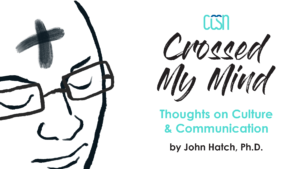 Column title: Crossed My Mind: Thoughts on Culture and Communication
Column title: Crossed My Mind: Thoughts on Culture and Communication
Column entry: “Baucham’s Fault(y) Lines: Misreading and Misrepresenting Fellow Christians,” (Part 3 in a series)
By John Hatch, Ph.D.
Eastern University (retired)
CCSN Senior Fellow
Column Description: As Christians, we are called to have the mind of Christ. This goes against the grain of our social and cultural conditioning. We seek personal or political advancement; Christ seeks the lost and the least. We grasp for cultural ascendency; Christ descends to the cross of love. This column is dedicated to thinking about culture and communication under the sign of the cross.
December 2023 / November 2023 / October 2023 / July 2023 / June 2023 / May 2023 / April 2023 / March 2023 / February 2023 / January 2023 / December 2022 / November(2) 2022 / November 2022 / October 2022 / August-September 2022 / June-July 2022 / January 2022 / December 2021 / October-November 2021
December 2023
In the previous (second) installment of this series on Voddie Baucham’s Fault Lines, I began by imagining how the author could have framed his critique of systemic racism narratives in such a way as to promote the discernment, edification, and unity of the Church. I then identified the book’s fundamental problem: Baucham’s choice of a polarizing, uncharitable frame through which to view some of his fellow Christians—a frame that does more to divide the body of Christ than distinguish truth from error, and in fact gives rise to untruthful representations in the name of defending Truth.
In this column, I’ll highlight some of the misrepresentations that characterize Baucham’s argument. Since he is zealous to defend the truth of Scripture, let me begin there.
Baucham claims to be for “biblical justice,” yet he never outlines the biblical vision of justice. Although Chapter 3 is titled “Seeking True Justice” and begins with the sentence “God clearly condemns injustice,” the author immediately changes the subject to God’s “condemnation of falsehood and lies.”[1] By the end of the paragraph, it’s clear that the subject of the chapter is really falsehood. While emphasizing that “we must be certain that we pursue justice on God’s terms,” Baucham focuses only on one dimension: “a pursuit of truth.” Accordingly, the rest of the chapter is devoted to debunking incomplete and misleading narratives about racialized police killings. While Baucham’s factual critiques and his call to build justice on a foundation of truth are important, that is the sum of his account of “biblical justice.” He makes no mention of Scripture’s concern for protecting the vulnerable and marginalized, or the Torah’s systemic mechanism to minimize intergenerational poverty—an example of distributive justice.[2] Instead, he focuses solely on retributive (criminal) justice; and even here, he offers no positive definition of what justice is.
Entire books have been written on the rich, multi-layered, grace-infused vision of justice found in Scripture, including Tim Keller’s Generous Justice.[3]Yet instead of acknowledging such important, biblically faithful work, Baucham lists Keller among those on the wrong side of the fault line, while failing to offer even a paragraph on what justice itself means in Scripture.
This omission has the effect of distorting biblical truth, while fueling political division in the Church. The readers most likely to enjoy Baucham’s “take-down” of a “liberal” talking point are never really challenged by him to measure any conservative talking points against Scripture. What’s more, in his representation of “biblical justice,” Baucham becomes guilty of the very thing he faults in Critical Race Theory: cherry-picking data while ignoring important pieces of the puzzle.
The same goes for his portrayal of the “fault line” purportedly caused by social-justice Christians. At the end of the Introduction, Baucham writes: “Churches are splitting over this issue. Major ministries are losing donors, staff, and leadership. Denominations are in turmoil. Seminary faculties are divided with some professors being fired or ‘asked to leave.’ Families are at odds. Marriages are on the rocks.”[4] Sounds terrible! Yet the book offers little or no supporting evidence for most of these claims—just a few anecdotes from Baucham’s perspective, and no statistics. This is a serious weakness, for two reasons.
First, Baucham condemns Critical Race Theory for relying on anecdotal evidence in support of its narrative and ignoring facts and contextual factors that go against that narrative—yet this is what Baucham generally does when offering evidence in support of his argument. For instance, he cites a private message received from a “leader in a well-known international ministry” who writes, “I would like to get your help regarding one of the largest missions organizations on earth that is becoming consumed with the racial identity and reconciliation ‘conversation.’ Indoctrination is a more accurate term.”[5] This sounds troubling; yet there is no way to determine whether the leader’s claims of indoctrination and a “sudden departure from the Gospel” are fair or not,[6] because we are given no hard evidence or contextual details. In chapter 3, when arguing against the existence of racial bias in police shootings, Baucham quotes Proverbs 18:17: “the one who states his case first seems right, until the other comes and examines him.”[7] Yet Baucham passes off one ministry leader’s private message as evidence that the unidentified missions organization is being pushed to the wrong side of the “fault line.”[8]
From such thin anecdotal evidence, Baucham draws the broadest possible conclusion: “The environment within evangelicalism is so hostile that it has a chilling effect. In this environment, dissent is not only unwelcome, but condemned.”[9] Hmm . . . Are we really to believe that the small minority of evangelicals who are working to reverse centuries of marginalization for people of color within the Church have managed to change evangelicalism-at-large into a hostile environment? And is Baucham not aware of the many people of color who have experienced being silenced or dismissed when trying to address racial concerns within predominantly white congregations and ministries?[10]
Second, the alarming statements made at the start of the book (and anecdotally “supported” along the way) are problematic because they prime us to respond to talk of racial justice in a fearful and uncharitable frame of mind. If a reader even provisionally accepts this frame, Baucham can then come across as more charitable than he really is—when, for instance, he drops comments about loving the people he critiques. But if we look more deeply, we find that Baucham’s criticisms of Christian leaders often rest upon distortions and omissions that serve his fear-inducing fault line narrative.
For instance, in his critique of Latasha Morrison, author of Be the Bridge: Pursuing God’s Heart for Racial Reconciliation, Baucham quotes her definition of racism: “‘a system of advantage based on race, involving cultural messages, misuse of power, and institutional bias, in addition to the racist beliefs and actions of individuals’” (p. 82, italics mine). He then immediately ignores the second half of this quote so he can place her on the wrong side of the fault line. Instead of taking Morrison on her own terms as a biblically faithful Christian who recognizes that sin operates include both in individual hearts/actions and in institutions/systems, Baucham repeatedly conflates her views with those of secular educator/trainer Robin DiAngelo (author of White Fragility) and accuses Morrison of “changing the location and therefore the nature of sin” such that “We are no longer dealing with the hearts of men” (p. 82, italics mine). As far as I can see, the only way Baucham could have arrived at such a transparently false conclusion is by filtering Morrison’s words (and Scripture) through a false dichotomy—either individual hearts or institutional systems—in keeping with his “fault line” narrative.
Unfortunately, Baucham gravitates toward false dichotomies throughout the book. For example, when he takes up Christianity Today’s suggested reading list on race, he misconstrues it as “a new canon” and an “attack on the sufficiency of Scripture.”[11] Clearly, CT’s intention for the list is to help some white readers fill a gap in their knowledge of contemporary cultural realities (not a supposed gap in Scripture’s theological/ethical answer to racial division/injustice), so that they may better apply the Bible’s call to justice in their cultural context; but Baucham is more interested in contorting the evidence to fit his “fault lines” narrative than presenting truth in its complexity. In chapter 4, he had framed Critical Race Theory as a “new religion” over against the Christian faith (a highly problematic claim in itself), and in chapter 5 he presented its proponents as a “new priesthood.” To make this story complete, he needs “a new canon” in competition with Scripture; and CT’s reading list seems to fit the bill—that is, if one is more interested in buttressing the narrative than getting at the truth.
While some zealots for CRT/anti-racism—particularly in public and secular educational contexts—may exhibit quasi-religious faith in its tenets and thinkers,[12] Baucham provides no robust evidence that this is true of the evangelical publications and leaders he critiques. Rather, he often reads these Christians’ statements differently from what they had in mind—i.e., lifts them out of crucial context—and shoehorns them into the anti-biblical categories he has created. Thus, despite his avowed passion for truth and protestations of love, the thrust of Baucham’s portrayal of brothers and sisters in Christ often turns out to be neither truthful nor loving.
To be clear, I don’t think Baucham intentionally misrepresents others in Fault Lines. Rather, he appears overzealous to battle falsehood at the expense of the humility, patience, and carefulness required to pursue truth in love.
In this series’ fourth and final column, I’ll further clarify this concern and conclude with lessons we can take from Voddie Baucham’s work on CRT and racial justice in the Church.
* The views of any CCSN columnists are their own, and do not necessarily represent the views of the CCSN. We invite and embrace a wide range of views and critiques on important communication and cultural issues. The CCSN is a community of Jesus followers who study communciation. We do not support or promote a particular social, political, or denominational agenda.
Notes
[1] Voddie T. Baucham Jr., Fault Lines: The Social Justice Movement and Evangelicalism’s Looming (Washington, DC: Salem Books, 2021), 41.
[2] I am referring here to the Year of Jubilee (see Leviticus 25:8-55). This model has some relevance to racialized poverty that stems to a large degree from generations of slavery, segregation, and discrimination (and the federal government’s failure to give freed slaves the promised “40 acres and a mule” to start a new life).
[3] Timothy Keller, Generous Justice: How God’s Grace Makes Us Just (New York, Penguin Books, 2010). See also Chris Marshall, The Little Book of Biblical Justice: A Fresh Approach to the Bible’s Teachings on Justice (New York: Good Books, 2005).
[4] Baucham, Fault Lines, 6-7.
[5] Baucham, Fault Lines, 136-37.
[6] Baucham, Fault Lines, 137.
[7] Baucham, Fault Lines, 44.
[8] He can, conveniently, avoid providing further context or countervailing voices since the perspective comes from a confidential communication.
[9] Baucham, Fault Lines, 138.
[10] This problem is discussed in Episode 4 of Dr. Omotayo Banjo’s CCSN podcast, Neither Jew Nor Greek (https://soundcloud.com/dr-banjo-532575487/ep-4-the-black-church). See also Dennis R. Edwards, Might from the Margins: The Gospel’s Power to Turn the Tables on Injustice (Harrisonburg, VA: Herald Press, 2020), 15-19, 185-88; Campbell Robertson, “A Quiet Exodus: Why Black Worshipers Are Leaving White Evangelical Churches,” New York Times, March 9, 2018, https://www.nytimes.com/2018/03/09/us/blacks-evangelical-churches.html, accessed December 14, 2023.
[11] Baucham, Fault Lines, 130.
[12] See John McWhorter, Woke Racism: How a New Religion Has Betrayed Black America (New York: Portfolio, 2021).

